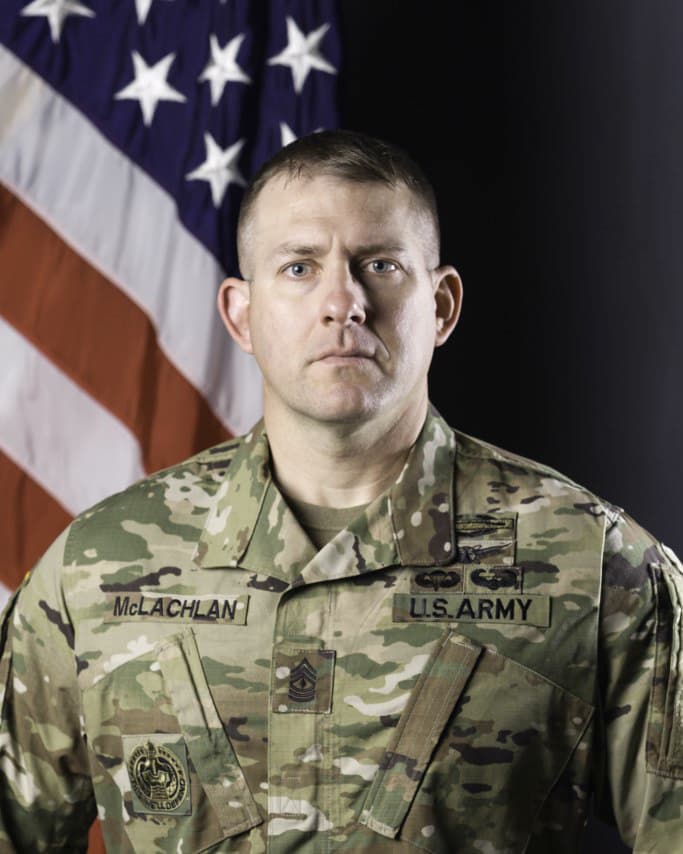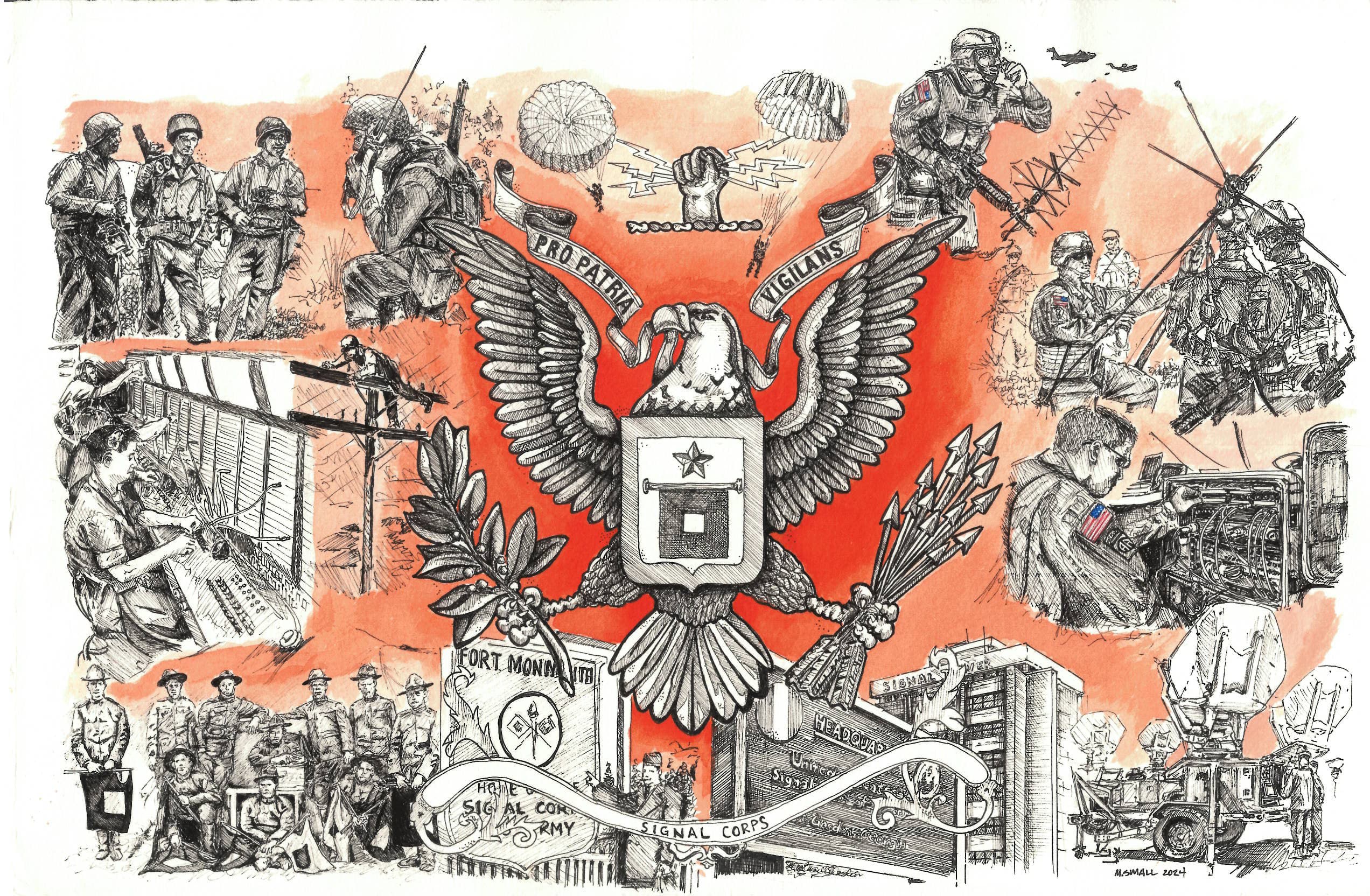Solving the Military Recruiting Crisis
Finding what resonates
By 1st Sgt. Wolfgang McLachlan, 59th Signal Battalion
Article published on: April 1, 2024 in the Army Communicator Spring 2024 Edition
Read Time: < 5 mins

1st Sgt. Wolfgang McLachlan, 59th Signal Battalion.
The various branches of the United States military have incorporated their respective individualized mottos into the very fabric of their organizational tapestry. The Army motto of “Be All You Can Be” is a call to those civilians within our populace who are searching to exchange their current life trajectory for one that fulfills an elemental need inside their spirit. It is an opportunity for our nation’s men and women to seek out both personal and professional goals which have yet to be realized in their current daily lives.
Despite these unparalleled prospects, the U.S. military is facing a grave recruiting challenge across the various branches. Thus, we are faced with the question of what novel approaches can the military employ to solve the recruiting crisis? The author believes that the answer to this Gordian knot can be found in identifying and targeting three populations within our American society who each branch’s respective motto, to include the Army’s recently revived “Be All You Can Be’ truly resonates with.
First, within today’s American society, there is a distinct lack of rites of passages available to our nation’s youth and young adults. The primal desire to seek out and encounter rites of passage is a common practice across various cultures and times throughout our species’ history. To test oneself against external challenges where the outcome is uncertain, to prove oneself to one’s peer group or tribe, to discover what we are capable of achieving – this is the very beating heart of our nation’s youth’s restless pursuit of meaning and self-discovery.
The military can offer these individuals endless opportunities to test themselves in an environment where everyone does not get a trophy just for showing up, to discover their limits, and to truly earn their place at the table among similarly assessed and hand-selected peers. Such insight into the inner workings of this population offers our nation’s military the philosophical framework to construct recruitment campaigns that directly speak to and call upon these men and women’s unrealized instincts.
Second, there are those within our society who are growing up in economically disadvantaged environments who know firsthand the emotional, physiological, and physical scars that living in a poor and marginalized household cultivates. From the inner cities to rural America, growing up in a poverty-stricken environment often generates a host of second and third tiered issues that have become so prevalent within these circumstances. For these individuals, the chance of joining an organization which offers them the means by which to elevate their current economic and social status is an incredibly appealing siren song. Service in the military offers these men and women, regardless of geographic location, race, culture, or familial structure, the opportunity to carve out a better life for themselves and their families. To an individual who has been raised knowing hunger, poverty, and social rejection due to meager financial means, service in the military offers them the economic and social mobility that seemed all but impossible otherwise.
Third, there is also a population within our society to whom the dreams and goals of their youth have not been realized. These men and women are usually aged between their late 20s to early 40s, and despite the effort, time, and resources they have invested into their endeavors throughout these years, their personal and professional goals have still eluded them. As the years pass them by, they feel the weight of mounting disappointment and ponder what their future holds. What options remain for them to achieve personal and professional fulfillment?
In short, these men and women are longing for a way to hit the ‘reset’ button on their lives and start over in an environment that offers them more than a dead end job, low pay, and an unfulfilling menial existence for the rest of their days. These often include college dropouts whose dream of higher education has slipped from their grasp, men and women who have grown up in traditionally disenfranchised and marginalized populations, and those hailing from broken homes. These men and women want to elevate themselves above their present circumstances and earnestly desire to be given another chance to prove their qualities to themselves and to their families. Service in the military offers just such a “reset.”
The key to future military recruitment success is to clearly message to members of these three key populations that what they are searching for can be found through service in the U.S. military. To facilitate this connection, we need only to look out across our formations, identify our service members who once belonged to these civilian populations, and tell their stories. In doing so, we will speak directly to our nation’s population of potential recruits and send the message that personal and professional success is indeed achievable through military service regardless of the economic background they were born into, the color of their skin, whom they love, or by what name they call God.
In selectively focusing on providing a vehicle by which an individual can fulfill his or her personal and professional goals, as explored previously in this work, such stories will resonate with those civilians who would truly make excellent service members. In doing so, their actions will reverberate across each service member’s respective sphere of influence and impact the next generation of our nation’s youth in ways both powerful and liberating.
Maintaining the Heritage

In its original form, this drawing was created as a commemorative print using Pigma Micron fine liners and watercolor. (Submitted and created by Maj. Matthew W. Small, Task Force Pegasus S6 OIC, 82nd Combat Aviation Brigade)
Author
First Sgt. Wolfgang O. McLachlan is currently serving in the 59th Signal Battalion, supporting Department of Defense communication initiatives in the Arctic. Throughout his career, he has served as an Airborne infantryman with combat tours in Iraq and Afghanistan, an infantry One-Station Unit Training senior drill sergeant, and a Signaleer in the U.S. Army Space and Missile Defense Command. McLachlan is a Sergeant Audie Murphy Club member. He holds a bachelor’s degree in human resource management, a master’s in education (adult education and training), and a doctorate in educational leadership (higher education).